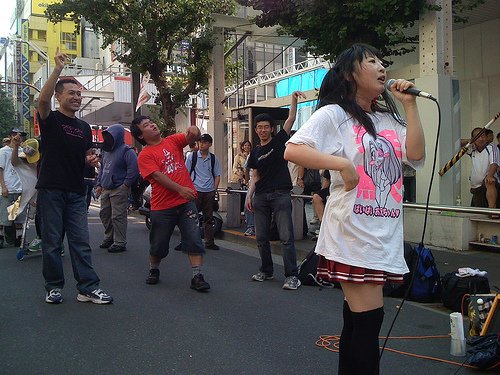I took the train into Tokyo on Sunday to meet a friend in Akihabara, the area of Tokyo famous as the electronics and all-around underground pop culture capital of Japan. I hadn’t been there on a Sunday in a while and was bowled over by the sea of people I saw, from otaku of every stripe doing their their shopping to middle-aged men headed home with computer purchases under their arms. Part of the reason it was so crowded was that the majority of Japanese get their monthly pay on the 25th, so people were flush with cash to go shopping with. Every Sunday they close off the main street and let people take it over for their own purposes. I caught an interesting “guerilla live” or street concert where singers will appear out of nowhere with a portable karaoke machine and start singing natsukashii (nostalgic) anime theme songs while a crowd of listeners gathers around and cheers. It was pure fun.

I’ve talked before about how an important trait among Japanese is kenson (KEN-son), meaning humility or modesty. It’s much better for a person to be self-effacing — for example, to deny a compliment on how good their English is — than to appear boastful and proud, which is why it can be difficult to say something nice about a Japanese person without them disagreeing with you. For all the noise made about Japan not apologizing for certain past events, Japanese people pretty much apologize at the drop of a hat, and there are many situations where the Western concept of “thank you” would be expressed as sumimasen (“excuse me for inconveniencing you”) instead. This isn’t always the case, of course. For example, most people will refrain from apologizing after a car accident as it could imply accepting fault. Another example of not apologizing would be our bank, the largest in our prefecture, famous for their haughty attitude because they’re #1. No matter what small mistake their staff might make — forgetting to credit a money transfer, say, or improperly filling out a document requiring it to be done over — the bank’s employees are trained never to apologize. This is called tonosama shobai (toh-no-sah- mah SHO-bai), roughly translatable as “running your business as if you’re a feudal lord in ancient Japan,” and I guess it’s a way to show your customers that you are an extremely strong leader in your field, since no other company could get away with that kind of crap. If you’ve ever wondered at some of the bizarre actions taken by Sony over the years — the hubristic attitude that nothing could assail their strong position in video games, the Sony-only media formats, the rootkit DRM scandal of last year — now you know what the concept is called in Japanese.
When English speakers come to Japan, we’re generally pleased to hear familiar words being used around us. Although phrases like “after service” (service after a purchase), “plus alpha” (meaning “a little extra something”), “unit bath” (a bathroom designed as a single unit) and “recycle shop” (any shop that sells used items) might sound a little odd, at least they’re easy to figure out without too much trouble. Not all foreign loan words come from English: there are words like arbeit (part-time job, from German), enquette (questionnaire, from French) or pan (bread, from Portuguese) that we must get used to. Then there are words whose origins can be incredibly confusing, such as why the Japanese word for stapler is hochikisu. It turns out that the E.F. Hotchkiss company made fine “paper fasteners” (staplers) at the beginning of the 20th century, and a shipment made it to Japan around 1910. The Japanese were fascinated with this ingenious device and, not knowing it was called, dubbed it a “Hotchkiss.” If you think something as boring as a stapler can’t be innovative, you should check out the TAMAHOTCHI, the cute new egg-shaped stapler that’s shaped like an egg, but one that staples papers for you quite handily. Winner of the Good Design Award!















